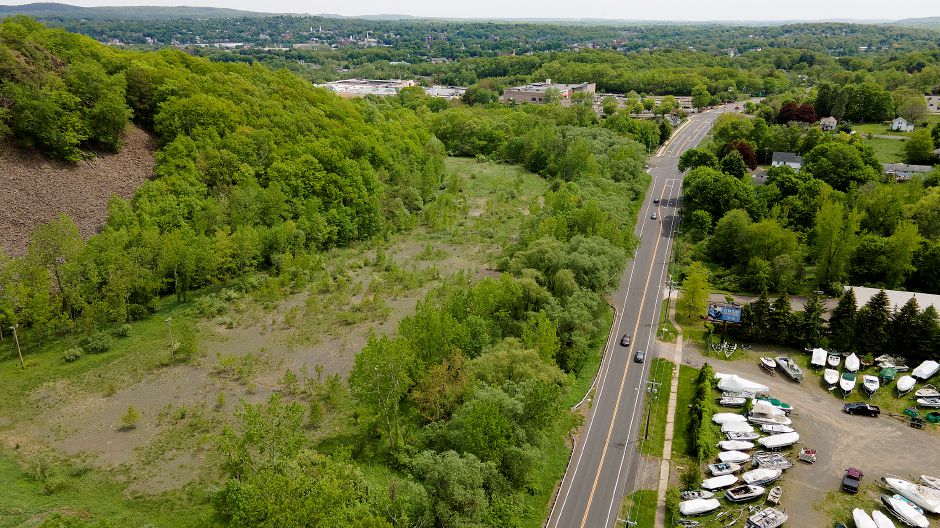MERIDEN — A Florida-based cannabis corporation won conditional approval this week to build cannabis growing and processing facilities on Kensington Avenue.
The plans presented by Trulieve Holdings, headquartered in Tallahassee, Florida, call for the construction of two industrial buildings, one 24,200 square feet in size, the other 35,200 square feet at 525 Kensington Ave., a roughly 20-acre lot that runs along Chamberlain Highway, near the Berlin border.
By Mary Ellen Godin , Record-Journal staff
The Planning Commission’s approval included several conditions detailed in staff comments. Trulieve must submit a final odor control plan to be approved by staff prior to the city issuing a building permit, for example. The odor control plan must be certified by an engineer credentialed in odor mitigation, and include details related to system design, building layout, management procedures and record keeping.
Other conditions stipulated that the property owner would be responsible for maintaining vegetation for driveway sight lines and to provide a plan for managing wastewater discharge.
The Inland Wetlands and Watercourses Commission, which met on Sept. 7, similarly granted the application conditional approval. Those conditions include the submission of a stormwater management plan, along with a plant species relocation plan, following the guidelines of the site’s rare plant survey findings report.
Trulieve has not yet received a Connecticut license to operate a cannabis facility in the state. The company is currently licensed by the state to operate a medical marijuana dispensary facility in Bristol.
On Wednesday, Planning Commission members’ discussion of the application focused largely on odor mitigation. Representatives for the company, along with environmental and civil engineers consulting on the project, addressed commission members’ concerns, responding to questions, both in person and remotely, through videoconferencing.
During the commission’s discussion of the application, some members questioned whether the group was being less stringent in its request for information about odor mitigation controls than it had with a previous micro-cultivator applicant, Gold Leaf Cultivation. The commission approved site plans for Gold Leaf’s plans to establish a cannabis micro-cultivation facility at 45 Gracey Ave., a property currently listed in city land records as a warehouse facility.
City staff noted that project scope includes repurposing and outfitting a previous industrial building with new odor and air quality controls for cannabis operations, while Trulieve’s proposal calls for the construction of completely new facilities that would be built specifically for cannabis growing and processing, with features related to air and odor control to be built into that design.
Company representatives provided an overview of some of the measures those controls would include.
Derek Starling, Trulieve’s senior director of facilities and engineering, described the company’s plans for the site as still being in the initial architecture and design phase.
Starling addressed commission members’ concerns about odors emanating from the property, saying the company has done “a very good job of designing” methods to minimize odors that come out of its buildings.
The company in designing its buildings and floor plans identifies areas “where we know there is a possibility of an odor being created or escaping,” Starling said. “We try to segregate that.”
He added air handling units will also be strategically placed to minimize smells and to reduce particulates in the air. The building will also use ultraviolet light, airlock doors, air filtration and other means to prevent contaminants from entering it, in addition to odor control, Starling explained.
Jonathan Booth, Trulieve’s heating ventilation and air conditioning manager explained that the company’s facilities are designed with maintaining a neutral environment in mind.
“We set up our rooms to recirculate air. We’re running air scrubbers 24-seven in most areas — not only for odors but also for helping with overall air quality,” Booth said. “It’s beneficial for us, not only to be a good neighbor.”
During discussion moments before Trulieve’s representatives reviewed those measures, Meriden Planning Director Paul Dickson said the development’s odor control could be listed as a condition of the commission’s approval.
When commission members asked what is the mechanism for enforcement, Dickson responded that it would fall under the purview of the zoning enforcement officer.
“We know that through the industry that there are standards and practices about mitigation,” Dickson said. “There’s a process to work through there, an industrial hygienist who can actually figure this stuff out. But it’s a matter of where they are in the process.”
Dickson recommended stipulating that the company must provide an odor control plan prior to the issuance of a building permit as a condition of approval.
“Because they will have to have the building completely finished, planned, before the building permit anyway,” Dickson said.
Planning Commission Chairman Kevin Curry said he is comfortable with city staff getting a satisfactory plan from the applicants before a building permit is issued. He and commission vice chairman Ross Gulino both noted that the plans for the facilities will evolve as the project moves forward.
H/T: https://www.myrecordjournal.com



